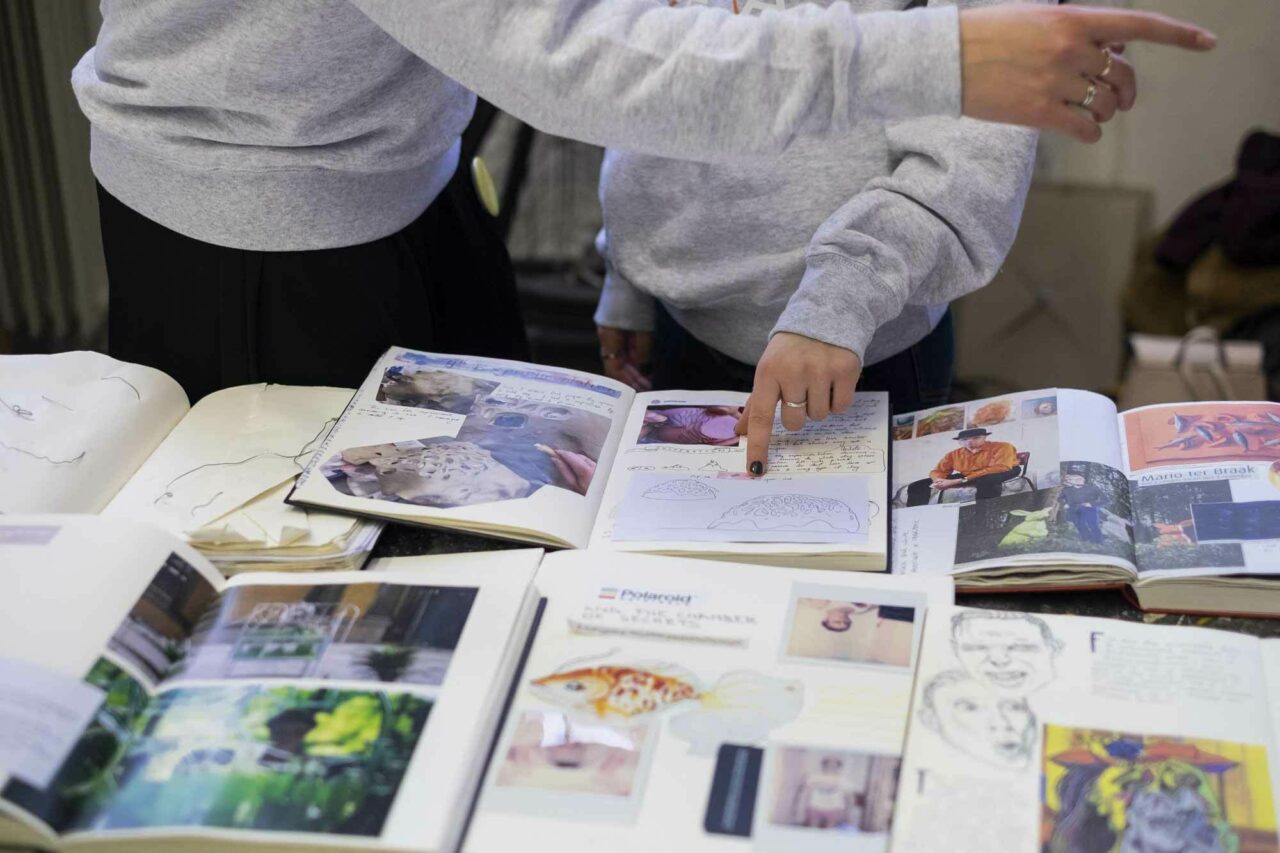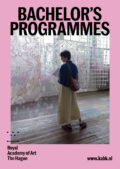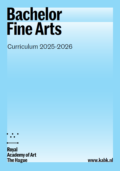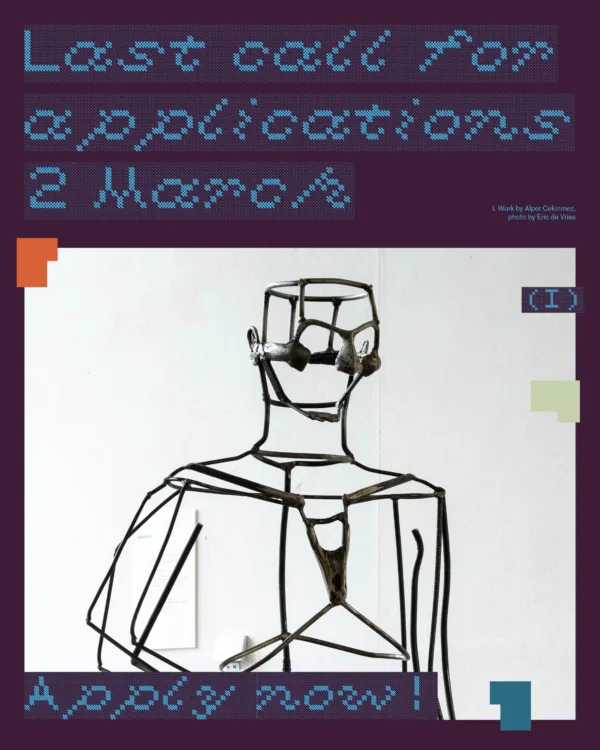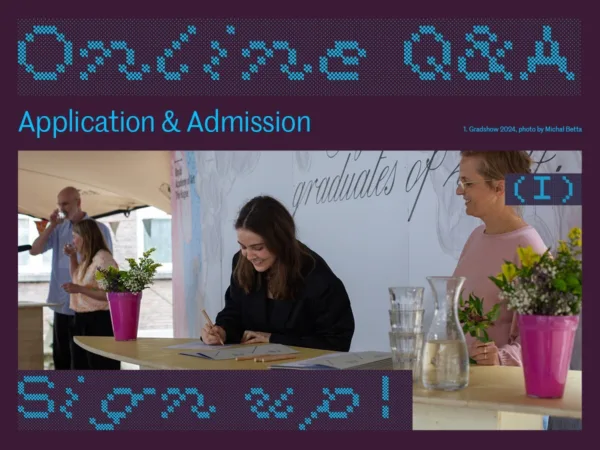Programme description
The Bachelor of Fine Arts programme spans over four academic years. The studio forms the foundation of the entire study programme, from which most interactions and engagements with tutors, guests, and fellow students occur. Our education bases itself on the understanding that contemporary art does not happen in a vacuum but is closely linked to historical, social, political, and cultural contexts and discourses.
We want the students to thrive in the vibrating and queer intersection of theory, research, community, and art. The best way to achieve that is by combining unorthodox teaching methods, such as communal meals, walks, singing, and gardening, with more traditional teaching models like tutorials, skill learning, lectures, and group talks.
An integral part of the programme is the study group ecosystem. These courses mix year groups, they present the opportunity to choose and focus on a specific skill, medium, or subject matter, from beginners to advanced levels. In January, the annual Festival of Ideas takes place - several days of research presentations by students, alums, tutors, guest lectures, workshops, presentations, film programs, cooking, and performances.
KABK also offers academy-wide programmes such as the Common Ground and a range of electives that students can choose from in the second and third study year. These courses are an excellent opportunity for students to discover their potential and ambitions and customize their studies accordingly.
The curriculum encourages the enmeshment of studio practice, professional practice, research, theory, and writing. Developing a sustainable relationship with writing is crucial to any artistic development. Thus, from year one to four, students maintain a writing practice that helps formulate artistic questions while developing a vocabulary appropriate to their practice. In year 3, experimental writing will be part of the critical practice program as the students work toward the final research paper in Year 4.
Full-time programme structure per year
The full-time bachelor Fine Arts degree spans over four academic years and amounts to 240 ECTS.
The first year is a formative one. As a new student, you get thrown into a whirlwind of impressions, contradictions, and experimentation. You get introduced to several key critical theories and concepts, research skills, and teaching methods. Together, we question our assumptions and expand our preconceived ideas on art and art history, and we slowly start developing that crucial, critical eye needed to create art ourselves. You get introduced to different workshops on practical skills and get acquainted with working with various materials—from metal casting to painting, from performance to experimental drawing. The aim is to lay a foundation so that you can direct your work independently in the next years. Year 1 differs from the other three because you work assignment based and within a more structured study schedule. It is a fun and intense year that sets the pace for the years to come.
Courses & ECTS credits 2024-2025
| Courses Semester 1 | ECTS |
|---|---|
| Studio Practice | 21 |
| Critical Practice | 6 |
| Common Ground | 3 |
| Collective | 0 |
| Total ECTS credits | 30 |
| Courses Semester 2 | ECTS |
|---|---|
| Studio Practice | 20 |
| Critical Practice | 6 |
| Common Ground | 3 |
| The Making of a Graduation Show | 1 |
| Collective 2 | 0 |
| Total ECTS credits | 30 |
As you enter the second year, you develop an internal engine for making and thinking. The focus in year 2 is on experimenting with techniques, which often entails concept building and constructions of linear/non-linear narratives. You become familiar with different artistic approaches relating to your ideas, concepts, and work-in-progress, which are presented and discussed. We will also introduce you to critical historical and contemporary epistemologies and discourses through lectures, seminars, reading groups, and presentations. This way, you are given the tools to enrich your practice, understand the history and context that shape contemporary art, and critically engage in issues in culture and society. Research in the arts (and the discourse surrounding it) will also be analyzed, critiqued, and questioned.
Courses & ECTS credits 2024-2025
| Courses Semester 1 | ECTS |
|---|---|
| Studio Practice | 16 |
| Presentations Studio Practice | 1 |
| Critical Practice | 6 |
| Studium Generale | 1 |
| Electives / IST | 6 |
| Collective 3 | 0 |
| Total ECTS credits | 30 |
| Courses Semester 2 | ECTS |
|---|---|
| Studio Practice | 16 |
| Presentations Studio Practice | 1 |
| Critical Practice | 6 |
| Studium Generale | 1 |
| Electves / IST | 6 |
| Collective 4 | 0 |
Total ECTS credits | 30 |
Year 3 focuses on mixing and merging artistic practice and research into independent art-making and a deeper contextualisation. With an open mind and well-developed experimental skills, you consolidate your practice and reinforce your decision-making. You apply your skills to address themes that are important to you and that you regard as essential for our culture and society. Collaboration and presentation form part of your exploration. You and your classmates plan and manage all aspects of an exhibition called The Spring Show as a test forum for the final degree show and an experiment for your future professional life. In the critical practice program, you chose a topic or discourse to do a deep dive into—such as art in public space, digital enmeshments, artistic research strategies, queer studies, anthropocentrism, non-Western and Indigenous thought, or speculative practices. At the end of the year, you will also start working towards your final research paper.
Courses & ECTS credits 2024-2025
| Courses Semester 1 | ECTS |
|---|---|
| Studio Practice | 17 |
| Presentations Studio Practice | 1 |
| Critical Practice | 6 |
| Electives / IST | 6 |
| Collective 5 | 0 |
| Total ECTS credits | 30 |
| Courses Semester 2 | ECTS |
|---|---|
| Studio Practice | 17 |
| Presentations Studio Practice | 1 |
| Critical Practice | 6 |
| Electives / IST | 6 |
| Collective 6 | 0 |
| Total ECTS credits | 30 |
Year 4 aims to prepare you to establish a professional art practice. In your studio, you work towards refining a body of artworks, guided by staff, externals, and peer discussions, while honing your theoretical and writing skills. During the year, you will mainly concentrate on the graduation show—a complex project that can unfold in several exciting directions. In parallel, you will write a final research paper where you articulate the ideas and questions that shape, inform, or tickle your studio practice. The research paper is an excellent opportunity to go beyond your assumptions and challenge yourself to find new ways to enrich your practice.
Courses & ECTS credits 2024-2025
| Courses Semester 1 | ECTS |
|---|---|
| Studio Practice | 15 |
| Presenting aResearch Paper | 3 |
| Thesis Writing | 12 |
| Collective 7 | 0 |
| Total ECTS credits | 30 |
| Courses Semester 2 | ECTS |
|---|---|
| Final Exam Project | 27 |
| Thesis Writing | 3 |
| Collective 8 | 0 |
| Total ECTS credits | 30 |
OER 2025-2026
Education and Examination Regulations
You can find information about the regulations and provisions dealing with the organisation of the programme and the assessments and examinations related to it in the Education and Examination Regulations (in Dutch: Onderwijs- en examenregeling; OER)
